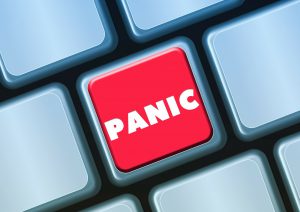 I’m going to request some mood-setting on your part to accompany this article. Trust me, it’ll enrich the experience.
I’m going to request some mood-setting on your part to accompany this article. Trust me, it’ll enrich the experience.
First, complete isolation is required. No one is to be in the same room as you. Turn off your phone and any chat windows you have open.
Next, we need dim, moody lighting. Draw the blinds or read this at night.
Finally, find some public-domain music, preferably something that amounts to an ominous drum beat. Press play.
Got all that? Okay. We’re ready to talk about writer’s block.
With page seventeen’s submission window just about to open, it feels like a good time to address one of the most notorious concepts behind being a writer. Maybe you’re someone looking to submit to page seventeen #11, or preparing for the competitions – maybe you even have an idea all ready to go.
Then the problem arises. You can’t get that idea on the page. You can’t get past the opening. Maybe you can struggle past the first few paragraphs until you find yourself on the edge of a canyon, and you can’t see any way to the other side. You can’t start. You can’t finish. You just can’t, can’t, can’t.
I could propose a series of methods to beat writer’s block. I could list the ways in which successful writers have dispelled the deadly curse. But chances are you’ve already read that. Writer’s block is one of the most widely-discussed aspects of being a writer; any how-to I put together will only join the mountain of articles that have come before.
So when it comes to methods, if you still need them, peruse what’s already out there and use trial and error to determine what works best for you. Half of it is contradictory anyway. One article will tell you that writer’s block is the cue to get away from your desk and do something else for a while, whereas another article will insist that you need to ‘chain that muse to your desk’ (in the words of Barbara Kingsolver, if you’re interested).
No. I’d rather talk more about writer’s block itself.
Turn the drum sounds off now.
The paralysis of writer’s block usually stems from insecurity – either one particular anxiety, or a tight little knot of several preoccupations. You’re not good enough. The idea is terrible. The words won’t flow. No one will read it anyway.
Pardon me for being direct, but no wonder you don’t get anything done if you’re that miserable about your own writing.
We’re all plagued by doubt, but if you’re letting doubt and insecurity get the better of you then you’re focusing on the wrong things. You’re a writer because you like being a writer. You like creating the stories, the articles, the viewpoints. Right?
Maybe you’re even set of making a career out of it – or you already have. And there’ll be bumps along the way just like with any other career – or any other hobby, for that matter. But if you want to keep going with that job, or that hobby, you find ways to overcome the situation if only to avoid the alternative: quitting. You adapt and evolve your methods based on the challenges you’re faced with. And you pat yourself on the back for finding a way through a sticky situation – then, you move forward.
Because guess what: writer’s block? It’s not that big a deal. There. I said it.
Open the blinds, or switch on a light.
The concept of writer’s block has enormous weight for many authors. The idea of writer’s block itself can often be the paralysis. Would there be so many writers struggling with this problem if the concept wasn’t named, catalogued and discussed so widely? One could say it’s the equivalent of a hypochondriac getting the flu and treating it like the Black Death.
Forget about writer’s block the same way you forgot about the boogie man being in your wardrobe. Tell yourself that you’re allowed to be stuck on something, to need a little more time than expected to get a specific passage the way you want it, but don’t call it writer’s block.
It’s actually a lot easier than it sounds. You just need to find the right way to communicate the idea to yourself. Talk to yourself in front of a mirror if you have to. Just don’t do it with anyone else in earshot – it can be a tad awkward.
Sometimes it’s a bigger matter. Life can disrupt the best-laid plans. Major events can derail your normal habits, or leave you with no mental space to be creative. Well, unless writing is your livelihood – in which case I might recommend having a plan B – sometimes it’s better to let it get in the way. Life’s an unpredictable mistress sometimes, and big things will happen that leave you bereft. Don’t punish yourself for that. The key is remaining optimistic that when you’re ready, the words will come again.
And if you’re still stuck on an idea, or can’t get past a scene no matter how hard you try – well, there’s a pretty straightforward way to start breaking down that barrier.
Invite someone into the room with you; alternatively, call or message someone. Tell them the idea you’re stuck on.
Because remember – you’re better than that, even if you don’t always believe it. You’ve devoted yourself to telling stories and embracing your own creativity – whatever your medium is. Don’t let a little hiccup like writer’s block get in the way.
Beau Hillier | Editor, page seventeen
